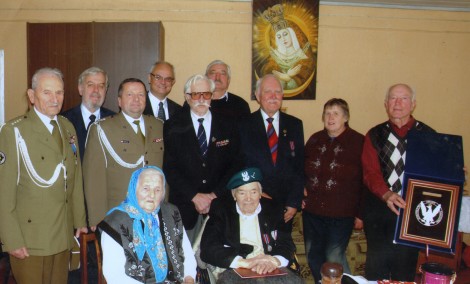- February 18, 2015
- 505
Let us remember the heroes of AK (The Home Army)!

The Home Army – the strongest and the best organized underground army fighting for the sovereign Poland – marked its 73rd anniversary.
Hundreds of thousands of young people stood up to defend the honour of their homeland back then. There are only few heroes of those events left, whom we can thank for their effort and devotion in fighting for the independence. The oldest such a hero, living in the Vilnius Region, is Stanisław Wierciński from Taboryszki – the participant in the Invasion of Poland in 1939, the soldier of the Home army, the prisoner in Łukiszki and the Siberian convict. Last year, during the National Independence Day in Poland, the witness of the Polish history of the 20th and the beginning of the 21st century celebrated his 100th birthday.
Stanisław Wierciński was born on the 11th of November 1914 in the village Taboryszki, near the town called Turgiele. In 1932, Mr Stanisław joined the Riflemen’s Association, and three years later was enlisted in the army. He served in the 6th Legions Infantry Regiment in Vilnius. There he graduated from the non-commissioned officers school, and achieved the corporal rank.
After the service in the army, Stanisław Wierciński came back to his home village. He worked in his own fields and wanted to start a family with 5 years younger Regina. However, the war made him postpone his plans. On the 31st of August 1939, he was conscripted. After coming back to his homeland, he joined the Union of Armed Struggle, which soon after was renamed into the Home Army. Under a pseudonym “Kula” (“The Bullet”), as the corporal he trained young people who wanted to enter the struggle.
However, after the war the peaceful life did not last long. In 1949, Mr Stanisław was arrested and put in prison in the Vilnian Łukiszki. He received 10-year sentence in łagry (gulags) for the Home Army affiliation. He was deported to Inta in the Komi Republic. His mother, three little children and 7 months pregnant wife stayed at home. After being released from łagry, Mr Stanisław came back home, but there was no work for him… The family decided to go back to Inta, where he could count on the work in the coal mine. There, the Wierciński family lived till the 1970s. After retiring, they came back to the home Taboryszki.
Today, Stanisław and Regina Wierciński are having grandchildren and great-grandchildren. Children are taking care of the aged parents, whom they love and give a special attention. Poles (not only those from the Vilnius Regious) do not forget about the proud veteran. On the 6th of November last year, Stanisław Wierciński was promoted to the rank of second lieutenant. The ceremony took place in the family house of Mr Stanisław. On the day before his birthday, he was visited by the group from the Odra-Niemen Association. More than 30 young people came with birthday wishes from all over Poland.
Prepared by B. Ł.
The youth greeted the veterans
The 14th of February is a special date for every Pole – on this day in 1942 the Home Army was created. On this occasion, the Vilnius Patriotic Youth came on the 16th of February to attend the Shrovetide meeting of the Charitable Association of Polish Veterans in Lithuania to wish the veterans all the best and give them small presents. The memory of soldiers and commanding officers of the Home Army was commemorated by a roll call of honour; a prayer for the fallen veterans was said as well. The youth thanked the veterans for their fighting during the war and setting a good example throughout their whole lives, and the chairperson of the Charitable Association of Polish Veterans in Lithuania Edward Klonowski read the message to the youth expressing his hope for the continuous action for the national identity, and that the future generations will be brought up according to philosophy: God, Honour, Homeland. After the meeting, everyone went to see a film in the hall of the House of Polish Culture in Vilnius, where the veterans were placed at the places of honour and loudly applauded by all the attendants.
Rajmund Klonowski
Translated by Tomasz Szatkowski within the framework of a traineeship programme of the European Foundation of Human Rights, www.efhr.eu.

